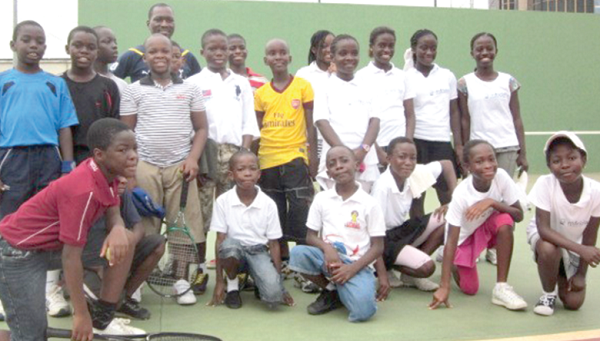
Prohibiting corporal punishment in schools - the African child must be loved and cared for, not beaten
The invitation by the Tema International School (TIS) Amnesty Club to be the guest speaker and launch their campaign (January 2018) against corporal punishment in schools took my mind back to my own childhood, to a gory incident, which I shared with the audience.
I was visiting an aunt in a compound house in Fante New Town, Kumasi, when a woman burst out from her room raging at her maidservant for something the poor girl had done or not done.
Advertisement
In her anger, the woman snatched a frying pan and slammed the side of the kid’s face; blood gushed out of the child’s ear.
Besides some initial murmurings, people went about their business as if nothing had happened.
It was the norm to make children suffer for their offences through any means necessary.
The TIS campaign brief
The TIS campaign brief stated as follows: “As enshrined in Article 28 of the United Nation (UN) Conventions, discipline in schools should respect children’s dignity.
For children to benefit from education, schools must employ orderly ways without the use of violence.
Therefore, governments must ensure that school administrators review their discipline policies and eliminate any discipline practices involving physical or mental violence, abuse or neglect.”
The brief asserted that “schools should implement proactive policies and efficient monitoring measures that would enable members of the school communities to be self-responsible towards creating [a] friendly, orderly and safe learning environment in order to promote acceptable behaviours and actions.”
The panel speakers included: a human rights education and activism coordinator of Amnesty International, Hannah Osei; Dr Wiafe-Akenten Brenya of the Department of Psychology, University of Ghana, Legon; a child’s advocate at Challenging Heights, a non-governmental organisation, Akua Boateng Duah; and the Kpone-Katamanso District Director of Education, Rosina Adobor.
TIS was represented by Chloe Asiedu, initiator, TIS Amnesty Club; moderated by Alistair Kirk; and emceed by the President of the club, Otuwa Dabanka.
Who will throw the first stone?
In a previous column, “Suffer the little children to come unto me,” (December 14, 2015), I noted that it was difficult to forgive the absurd reasons I heard when discussing (on radio or TV) the issues of school discipline with panels of grown-ups who should know better than hurt children.
The most abusive reason, the one that has become the default mantra or excuse-in-chief, for beating up kids, is the archaic biblical quotation, “Spare the rod and spoil the child.”
Many adult abusers stand ever ready to throw “the first stones” without ever stopping to “remove the mote” from their own eyes, considering society’s own contribution to the overall indiscipline and poverty we see today.
Throughout history, children have been subjected to domination, murder, abandonment, incarceration, mutilation, beatings, and forced labour – to name some examples from the litany of child maltreatment.
Many practices we know today to be brutal and senseless were entirely in keeping with the ethos of the past, but unfortunately some still persist.
Some ideas promoting the abuse of children are stories with deep but primitive religious roots.
Two famous examples of the widespread killing of children were those ordained by the Pharaoh at the time of the birth of Moses (Old Testament), and by Herod (New Testament) when the birth of Jesus was foretold to him.
For goodness sake, if kings themselves can’t locate Moses or Jesus, why must children suffer?
Another culprit, one King Ahaz, was cited also for barbarous behaviour. He “burnt incense in the valley of the son of Hinnom, and burnt his children in the fire” for ritual sacrifice [2 Chron. 28:3].
Such hideous unquestioned precepts possibly set the tone for child beatings that have lingered to this day.
Societal hypocrisies
When Jesus himself resorted to the whip, it was not against children; it was against the crooks who had turned the temples into “dens of thieves”.
Societal hypocrisies are too much with us.
In Ghana, for example, are naughty children the culprits who put the ghost names on the nation’s payroll, paid out dubious judgement debts, and collected bribes for our learned judges?
Children need good sanitation, water, and toilet facilities in the public schools. Such are the basic human necessities which every discerning adult has to help to provide in their very own communities and beyond!
Silly reasons for child abuse run the gamut from anger to moral outrage, resulting sometimes in the injury to a hapless child from an overzealous, bulky disciplinarian.
Creepy interpretations of religions, insidious native superstitions, half-baked literacy, and cold-blooded illiteracy breed some of the spookiest offenders clothed in holier-than-thou pretenses.
Silly notions and fallacies are still held and propagated to this day. In parts of Africa, widespread poverty made children an economic liability, and were often abandoned, sold, or mutilated to make them more piteous and effective beggars.
The United Nations’ 3 Ps
Today, in lieu of the abusive, decrepit adage, “Spare the rod and spoil the child”, the UN introduced a charter that cut across cultures, nationalities and religions.
The UN Convention on the Rights of the Child (UNCRC) guarantees:
1. Rights of provision (adequate nutrition, health care, education, economic welfare);
2. Rights of protection (from abuse, neglect, violence, exploitation); and
3. Rights of participation (a voice in decisions affecting the child.
The UNCRC places an obligation on countries to provide and protect these rights. Ghana was one of the first nations to have ratified it.
It’s now time to practice what was signed to protect the children.



